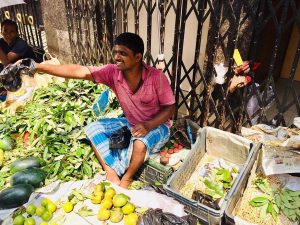People of Bharat: Ramkrishna Mondal, Kolkata

Bustling with commotion and cries of vendors, the street of Bijoygarh comes alive in the wee hours of the Kolkata mornings. Sauntering down the street, I see a crowd beginning to circle around a spread of fresh fruits. On reaching closer I catch a glimpse of a man in his early 40s, engaged in passing fruit bags. I hear him chat with his customers; his smile has a peculiar warmth that beckons you. I wait for the crowd to thin and approach him, requesting a conversation. He obliges, beginning with his name, Ramkrishna Mondal; and urges me to ask all I need to know.
We begin with the very beginning. Born to a Bengali family, he speaks of being raised in Magrahat; he has been in Kolkata all his life since. Growing up with his three siblings in a rural village, their family would rear sheep and cows for a living. He remembers his father walking the herd to farms every morning. But the family needed more to sustain; their mother contributed by selling milk at the neighbouring homes. She continued with her rounds till he turned 15.
Reminiscing about a past plagued with poverty he adds,‘Khub kharap obostha chilo, baba moder nesha korto’ (We were in dire situations and my father would take refuge in alcohol) trailing off in poignant recollection. Confessing how he always wanted to study, he speaks of the next five years of his life which he spent grazing cows. Long hours and hard labour weren’t always enough. There were days the family would sleep through hunger. Looking back at me, he says that he resorted to selling fruits in the hope of avoiding such days. Hunger, he emphasises, pestered him to continue despite the risk. Time has taught him to manage his perishables, the source of livelihood, wisely! He proudly confesses how buying the optimum quantity of fruits keeps him away from incurring losses.
People finding him friendly and fair, prefer his fruits and keep coming back for a quality that never disappoints. Cherry-picked from the fruit orchards of Barabazar, Sealdah or rare occasions from the orchards of his ancestral village, his daily expenses for the fresh fruits range around Rs. 6000, at times surging to Rs. 7000 or dropping to Rs. 5000 occasionally. Selling all he has by the end of each day, he spends Rs 6000 on an average for the cocktail of fruits he purchases. After working for ten hours in the market, he returns with the evening sun to toil in the fields. He indulges in farming and cultivating cereals, which suffices to feed his family for 6 months. The Mondals end up buying their groceries from the nearby market for the rest of the year.
Talking on the trade, he quips how on an average, he earns a profit of Rs. 500 to Rs. 600 each day. The profit barely sustains the daily expenses of the family. On rare occasions when they are able to save, the amount goes towards paying for the only LIC policy they own worth Rs. 2083. Apart from this quarterly payment whatever gets saved is deposited in the bank. On days when he needs a little extra money, Ramkrishna borrows a loan of Rs. 2000 to add variety or just enhance the quantity of the fruits usually exhibited. He keeps repaying these recurrent loans as soon as he earns a little extra. Tempted to know more on how he managed to begin at the first place, I enquire if he had to borrow when he started. Lost in thought for a while, he recalls asking a friend once for an initial investment of Rs. 2000.
Concern intermingled with curiosity, nudge me to ask if he ever plans to switch from his line of work, to which he vehemently denies. He says he prefers a life of limits. Having seen the repercussions of addiction closely, he keeps his distance with a tea cup too. His two kids from the marriage of 19 years abide by the same self control. Smiling to himself he recounts the day his daughter was caught stealing along with her friends, back in 2013,‘Amar meye churi korechilo ekbar jokhon ami oke shasti dilam.’ He feels punishing her then, changed her.
Jingles of fruit names bring him back, and he diverts his attention to the onlooker passing by. Ramkrishna chants out the fruit names but seeing the buyer walk past his stall, he narrates how the number of customers is never fixed. While weekends keep him hopeful, some weekdays with just a single customer push him towards expecting the worst. He confronts me with a confession,‘Ekhon competition er din kaal, bhalo bebohar na korle loke phire ashbena’ (In the fear of losing my customers in these competitive times, I have turned into a conversationalist.) Fearing he spoke too much too soon, he reassures me that he remains respectful in all his interaction and never uses it as a means to bluff or cheat. I ask him if the fellow fruit vendors face similar fears. He remarks on not being sure but adds that they have always been helpful. In times of need, they sell his share if he is unable to man his own stall.
He yearns to keep his business running; and dreams to be successful enough to expand it in future. But taking the tech way isn’t something he personally prefers. While he aspires to keep learning, he still abstains from payment gateways or even the use of a smart card. Content in his life, he feels his work to be fulfilling the way it is, away from the digital fraud or the e-money. Trailing back to his reverie, he utters how being an illiterate and having experienced poor finances for most of his life, the pursuit for financial growth seems like a Sisyphean task.
Hope hasn’t abandoned him completely though, he continues ‘Er theke beshi aar kichu hobe na’ (What I am doing is best for me, nothing can be better than this.)
This research was developed as part of the Bharat Inclusion Initiative.
